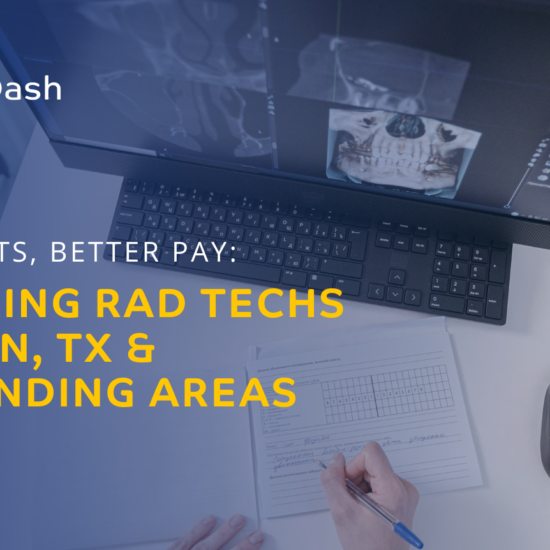The Top 8 Current Career Trends in Healthcare
With the many changes the healthcare industry has faced over the past year, clinicians are wondering what trends are to come. Considering the current career trends in healthcare — from technological advances and increased personal care to a rise in industry degree program enrollment — 2021 is looking to be another exciting year.
Here are eight of the top healthcare career trends for 2021!
1. Technological Advances
Technological advances have made an especially huge impact on the current career trends in healthcare.
Budding careers like MRI technologists are expected to boom over the next decade as diagnostic equipment continues to incorporate the latest technology.
Any healthcare professional that wants to move up the ladder has to understand the latest technological advancements. Technology should also positively impact how human resources professionals recruit, develop, and retain the brightest healthcare talent.
2. Personalized Care
Patient-driven initiatives that personalize the relationships between patients and healthcare providers will become increasingly important throughout 2021. Just as customers are the focal point of retail stores, healthcare professionals need to adapt to a trend that focuses on personalizing their relationships with patients.
Hiring managers have made personalization in the healthcare industry a priority when screening job candidates. The once predominantly technical skill-oriented interview process has now shifted to a more balanced approach between technical and interpersonal skills. The term “bedside manner” has risen to a new level of importance.
3. Digital Communication Skills
Before the COVID-19 pandemic hit, most large healthcare institutions were already integrating digital communications into their interaction platforms. Telehealth platforms allow healthcare providers to work more efficiently without sacrificing accuracy and personal touch. More than 50 percent of all hospitals operating in the United States communicate with patients and medical professionals via a digital platform.
Since COVID, the shift toward a primarily digital communication system has reached an all-time high and will continue to develop into the new norm. Healthcare professionals should focus on their digital communication skills more than ever.
4. Healthcare-Based Programs
We’ve all heard about the high level of clinician burnout amid the pandemic, but colleges have simultaneously seen an increase in enrollment in their medical and nursing-related programs. Statistics supporting this trend have recently begun to circulate in the news.
The American Association of Colleges of Nursing reported a 6% increase in baccalaureate nursing programs on a 2020 preliminary study of 900 nursing schools. According to the Association of American Medical College, 2021 applications for people entering medical school are up 18% compared to last year.
5. Virtual Hiring
Another career trend created by the pandemic involves conducting interviews on platforms like Zoom and Skype. Although the move to digital interviews is not necessarily a groundbreaking career trend, it is a significant trend for healthcare professionals that want to advance their careers.
The art of mastering a Zoom interview requires a unique skill set when compared to traditional in-person interviews. Eye contact and body language are still essential, but learning how to present your credentials over a digital platform may pose new challenges for making great impressions.
6. Outpatient Career Options
Over the next decade, healthcare professionals will be pushed to transition many services into outpatient care environments. Conducting diagnostic tests, implementing treatment strategies, and completing therapy-based care will continue to move out of the inpatient setting.
The science won’t change, but how you apply the science will. Outpatient services are rising in popularity mainly because they are often more cost-effective and can be more convenient, particularly if the healthcare professional delivering the services does a great job of planning each visit.
7. Customized Care for Boomers
Over 50 million seniors live in the United States currently, and that number is expected to grow substantially as the last of the baby boomer generation enters their golden years. The problem here is not the sheer number of seniors but the health issues that many boomers bring into the last stages of their lives.
Seniors have higher stress levels, more health issues, and less healthcare coverage than the generation that preceded them into retirement. The result has been the emergence of a new type of specialist care just for the baby boomer generation. Healthcare professionals will have to follow a more preventive healthcare approach to service this group than they have for the better part of their careers.
8. Convenient Care for Millennials
Millennials bring a unique set of challenges that will help shape healthcare careers in 2021 and beyond. Not focusing on major health issues and inadequate healthcare coverage quite as much as the boomer generation, millennials are all about fast service, less expensive treatment options, and virtual care.
Millennials are more likely than any other generation to research healthcare topics online, which means they have a pretty good idea of what they want and how they want it. Healthcare providers will need to keep up with millennials by staying current with the medical information presented online.
Want to Be Part of the Current Career Trends in Healthcare?
At NurseDash, we continue to pave the way for on-demand healthcare staffing. Our experts are dedicated to recognizing industry trends and keeping our clinicians up-to-date on the latest advances. Career support, work-life balance, continued education, and top-of-the-line training opportunities are just a few of the reasons healthcare professionals are choosing NurseDash in 2021!






